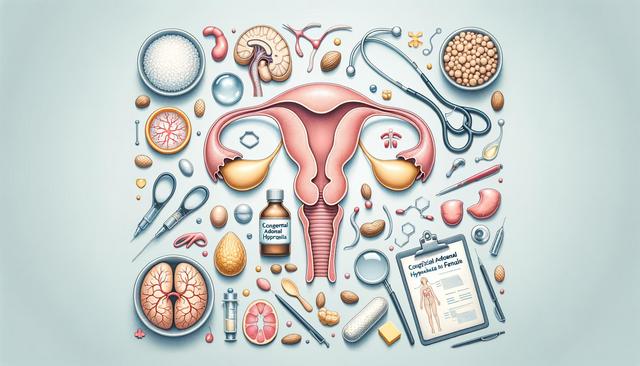Understanding Congenital Adrenal Hyperplasia (CAH)
Congenital Adrenal Hyperplasia (CAH) refers to a group of genetic disorders that affect the adrenal glands, small organs located above the kidneys. These glands produce essential hormones like cortisol, aldosterone, and androgens. In individuals with CAH, an enzyme deficiency disrupts hormone production, leading to an imbalance. For women, this condition can have significant implications on physical development, fertility, and overall hormonal health. CAH is typically inherited in an autosomal recessive pattern, meaning both parents must pass on a defective gene for a child to be affected. There are two primary forms: classic CAH, which is usually detected at birth, and non-classic CAH, which may not become apparent until later in life. Recognizing the signs early and seeking appropriate care can make a substantial difference in managing the condition.
Common Symptoms of CAH in Females
The symptoms of CAH in females can vary widely depending on the severity of the enzyme deficiency. In classic CAH, symptoms often appear shortly after birth, while non-classic CAH symptoms might not show up until adolescence or adulthood. Common symptoms include:
- Ambiguous genitalia or atypical physical development at birth
- Early signs of puberty, such as rapid growth or early development of pubic hair
- Severe acne or oily skin
- Irregular or absent menstrual periods
- Excessive body hair (hirsutism)
- Possible fertility challenges
Being aware of these symptoms allows women to seek medical advice promptly. Healthcare providers typically use blood tests, hormone panels, and genetic testing to diagnose CAH accurately. Early diagnosis and appropriate treatment can help manage symptoms effectively and improve quality of life.
Diagnosis and Treatment Options
Diagnosing CAH involves a combination of clinical evaluation and laboratory tests. Hormonal assays measure levels of cortisol, aldosterone, and androgens. In some cases, an ACTH stimulation test is performed to assess adrenal gland function. Genetic testing can confirm the diagnosis by identifying mutations in the CYP21A2 gene, which is most frequently associated with CAH. Treatment strategies focus on hormone replacement therapy to correct imbalances. Depending on the form and severity, treatment may include:
- Glucocorticoids to replace cortisol
- Mineralocorticoids to maintain sodium balance
- Salt supplements, particularly in infants with salt-wasting CAH
- Regular monitoring and adjustment of medication based on life stages and health changes
Women with CAH often benefit from a multidisciplinary healthcare team, including endocrinologists, gynecologists, and sometimes fertility specialists. Regular follow-ups are crucial to ensure optimal hormone levels and to address any emerging health concerns.
Living with CAH: Lifestyle and Emotional Well-being
Managing CAH goes beyond medication; it involves lifestyle adjustments and emotional support. Women living with CAH may experience challenges related to body image, fertility, and mental health. Building a strong support system and seeking professional counseling can be incredibly beneficial. Key aspects of living well with CAH include:
- Maintaining a healthy diet and exercise routine to support overall well-being
- Managing stress, as it can impact hormone levels
- Educating oneself and advocating for personal health needs
- Joining support groups to connect with others who understand the journey
Awareness and open communication with healthcare providers can empower women to lead full, active lives. Emotional resilience and proactive health management are essential components of thriving with CAH.
Fertility and Reproductive Health Considerations
Fertility can be a significant concern for women with CAH, but many achieve successful pregnancies with proper medical support. Non-classic CAH generally has a less severe impact on fertility compared to the classic form. However, hormonal imbalances may lead to irregular ovulation. Treatments may include:
- Hormonal therapies to regulate menstrual cycles
- Assisted reproductive technologies if needed
- Preconception counseling to plan for a healthy pregnancy
Pregnancy management for women with CAH often requires specialized care to monitor hormone levels and ensure both maternal and fetal health. It’s important to work closely with a knowledgeable healthcare team before and during pregnancy. By staying informed and proactive, women with CAH can navigate reproductive health challenges with confidence and support.
Conclusion
Understanding Congenital Adrenal Hyperplasia is essential for women who may be affected by this condition. Early recognition, appropriate treatment, and ongoing support can make a significant difference in managing symptoms and living a fulfilling life. If you suspect you might have CAH or are already diagnosed, remember that you are not alone—many resources and healthcare options are available to help you thrive. Staying informed and connected is key to a healthier, empowered future.






